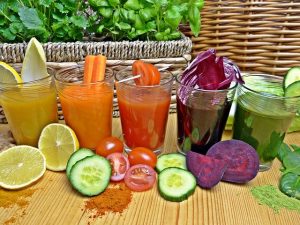Digestion is a physiological process by which ingested foods are gradually broken down and transformed into assimilable substances: amino acids in proteins, small molecule carbohydrates, fatty acids, mineral salts, vitamins and other compounds needed by the body.
What you put on your plate every day has a lot to do with digestion and good health. But it’s not just what you eat that’s important. How much you eat and how you do it – relaxed or in a hurry – play important roles.
Eat enough fiber
Fiber will not be missing from your diet, either in the form of cereals or fresh fruits and vegetables. It helps eliminate food waste, and a deficiency actually means a lack of stool, forcing the colon and major digestive disorders. Specialists recommend between 15 and 25 grams of fiber a day.
To optimize your fiber intake and promote good overall health, here are the recommended types of foods:
 Grain derivatives – cereals, bread, rice and pasta – are rich in complex energy-rich carbohydrates and provide important nutrients, including fiber. Choose whole grains when possible, as they contain more fiber than refined grains.
Grain derivatives – cereals, bread, rice and pasta – are rich in complex energy-rich carbohydrates and provide important nutrients, including fiber. Choose whole grains when possible, as they contain more fiber than refined grains.- Vegetables : – Vegetables have few calories and almost no fat. They provide fiber, vitamins, minerals and phytochemicals.
- Fruits : Fruits generally have fewer or fewer calories and fats, but contain beneficial fiber, vitamins, minerals and phytochemicals. Fresh fruits are generally richer in fiber than canned ones. Dried fruits contain a lot of fiber, but they also contain a lot of calories.
Not only fiber, but also foods rich in enzymes facilitate digestion. Cheese, bananas, papaya, pineapple, honey, here are some products of this kind that should not be missing from the table.
Avoid fast food and semi-prepared food. They are not nutritious and can cause imbalances in the digestive tract.
Everyday yogurt has a very important role for digestion. It provides the digestive tract with beneficial lactic acid bacteria to eliminate infections and any discomfort.
Spicy foods should be avoided, as well as foods that contain excessive fats.
Excess fat slows down digestion and can cause heartburn, bloating and constipation, in addition to increasing the risk of cardiovascular disease, diabetes.
Drink plenty of fluids
Fluids promote healthy digestion by lubricating food residues so that they pass more easily through the digestive tract. In general, water is the best drink. Milk, juices and other beverages contain about 90% water, so they can supplement your daily fluid needs. Caffeine and alcoholic beverages are not included. They act as diuretics, increasing the amount of urine and fluid loss.
Careful! Although you should drink at least 2 liters of fluids a day, you should not consume them during a meal but at least 30 minutes after. Liquids drunk during the meal and very cold, make digestion difficult, giving the feeling of bloating.
Be a follower of healthy eating habits
As important as what you eat is how you do it:
Eat in moderation – Excessive meals overload the digestion process. Too much food increases digestive waste and discomfort.
Eat at regular times – Your digestive organs work better when you follow a regular schedule – breakfast, lunch and dinner.
Relax during the meal – When you are relaxed, chew better, gastric and intestinal juices are secreted more easily and the digestive muscles contract and relax normally. When eating too fast, do not chew carefully and often swallow air, which leads to chest burns, bloating, gas.
Do sports regularly
 Your digestive system will not be lazy if you are not! Maintaining an active lifestyle is an essential aspect of digestive health.
Your digestive system will not be lazy if you are not! Maintaining an active lifestyle is an essential aspect of digestive health.
Aerobic exercise stimulates the activity of the intestinal muscles, helping to transport food waste faster through the intestine.
Walking is the most common form of aerobic activity because it is easy, handy and inexpensive. Other examples of aerobic exercise are: cycling, basketball, tennis, swimming, etc.
Keep stress under control
Stress can affect digestion. When you are stressed, your digestive muscles put in less effort, digestive enzymes are secreted in smaller amounts, and food residues are eliminated more slowly.
Limit alcohol / Avoid tobacco
Alcohol can lead to inflammation of the inner lining of the stomach and relaxation of the lower esophageal sphincter, which prevents acid from returning from the stomach to the esophagus. These actions can lead to bleeding or burning in the head of the chest. Alcohol can worsen symptoms such as diarrhea or nausea. Excess alcohol is the leading cause of liver and pancreatic disease.
Air swallowed during smoking can cause gas and bloating. In addition, smoking can cause ulcers and cancer of the esophagus.
